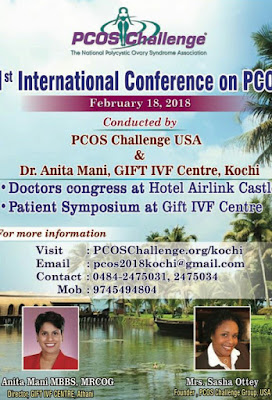"The human body heals itself and nutrition provide the resources to accomplish the task."
An ideal diet plan for the PCOS not only comprises food; the timing of meals, frequency and duration of the meals and the cooking methods are also equally important.
Ideally, within thirty minutes of waking up, we need to take some form of food to kick start our metabolism. A well-balanced breakfast is a must, skipping that would be a big NO NO. It is better to eat every 3 to 4 hours, rather than taking infrequent big meals. Sounds good doesn’t it, you need to eat more often if you want to lose weight and control your PCOS.
Eating should not be a hasty affair, take plenty of time, enjoy every bite to savor the goodness and flavor of the delicious food that nature has kindly bestowed upon us (we do not know how long we are going to get this!). To a great extent, digestion should happen in the mouth itself, so make it a point to chew the food properly. The brain takes about twenty minutes to register that stomach is full, hence if you eat quickly you are at the risk of consuming more food than is required. Chances are there that even though your stomach is full you will go on eating, so go slow.
Likewise, it is vital to understand the significance of glycemic index in controlling PCOS. Glycemic index (GI) indicates the level of sugar in blood after food intake. The rate at which blood sugar level shoots up in our body will vary depending on the type of carbohydrates that we eat. The insulin levels in the body are way too high in PCOS, which is the main reason for insulin resistance and high androgens. (Androgens are male hormones, which are present in normal women in small quantities) PCOS women should eat low glycemic index foods to avoid sudden spurt of blood sugar level. For more info see http://bangaloreivf.blogspot.ae/2014/09/low-glycemic-food-chart-for-pcos.html
Reduce calorie intake if your weight is on the higher side, around 60 % of women with PCOS are overweight and it has been proven that in a significant number of women losing weight lead to reduction of symptoms of PCOS.
Tips
Food should be always eaten fresh – “eat like Chinese, they always take it boiling”.
1. Take natural foods, avoid processed food, limit sugar and sweet intake. (did you know that sugar undergoes lots of chemical treatment before it looks bright white?)
2. Choose whole grains like boiled rice, whole wheat flour, millets (Ragi), oats etc.
3. Reduce salt intake, this will help reduce the risk of hypertension and other cardiovascular diseases as well.
4. Choose unsaturated fats. Boil, grill, steam, bake and avoid microwaving and frying.
5. Make sure that you are getting enough protein with every meal for controlling PCOS.
1. Take natural foods, avoid processed food, limit sugar and sweet intake. (did you know that sugar undergoes lots of chemical treatment before it looks bright white?)
2. Choose whole grains like boiled rice, whole wheat flour, millets (Ragi), oats etc.
3. Reduce salt intake, this will help reduce the risk of hypertension and other cardiovascular diseases as well.
4. Choose unsaturated fats. Boil, grill, steam, bake and avoid microwaving and frying.
5. Make sure that you are getting enough protein with every meal for controlling PCOS.
Varieties of food
a. Green leafy vegetables are very good for you, so when you go for grocery shopping keep an eye for them
b. Pulses are very good sources of protein and a good low-calorie alternative to the non-vegetarian food.
c. Whole grains must occupy only a small portion in your meal plate, bulk should be vegetables, salads and pulses.
d. Fish, chicken, lean meat and lean cuts of red meat can be taken in moderation, but they should not be fried in oil.
e. Oil can be olive oil or any other plant source oil, essential fatty acids are as important to health as vitamins but should be consumed in moderation. But it should be noted that olive oil is not suited for Indian style of cooking or deep frying as the smoking point is very low, hence is best used in salads.
Foods to avoid
Sweets and candies are neither good for you nor for the kids. Generally, people gift candies and chocolates to kids as if they are resistant to the bad effects. Please understand that they are bad for everyone, so please stop buying them for kids as well.
Instead of ice creams, choose fruit platter when you are eating out. Skip the bakery section in supermarkets, so that you are not tempted to buy cakes, pastries, biscuits or other sweets. Everyone knows that soft drinks and energy drinks are bad for health, but still continue drinking them. Let us save the health of the future generation, don't show your love for your children by buying them chocolates, ice creams or fast food
http://bangaloreivf.blogspot.ae/2017/08/article-on-pcos-causes-symptoms-and.html
http://bangaloreivf.blogspot.ae/2017/08/article-on-pcos-causes-symptoms-and.html
Dr. Anita Mani
Infertility Specialist at Gift IVF Centre
www.giftivf.com
--------------------------------------------------------------------------------------------------------
Dr. Anita Mani is a renowned infertility specialist in south India with 18 years experience in ART (Assisted Reproductive Technology). Dr. Anita has successfully set up ART hospitals in Cochin and Bangalore, along with her spouse Dr. S Mani. She completed MRCOG, from Royal College of Obstetrician and Gynecologist, London, DFFP from ART Warwick university and worked in the UK for 5 years. Dr. Anita believes in scientific and ethical practice and is currently the director of Gift Gyno IVF centre and SATYA Ayurvedic Centre, Cochin. Apart from advanced laparoscopic surgeries, she is also an expert in various ART techniques including IVF, IUI, ICSI, donor egg/sperm. Her proficiency is in genetic abnormalities and high-risk pregnancies.


No comments:
Post a Comment
Note: only a member of this blog may post a comment.